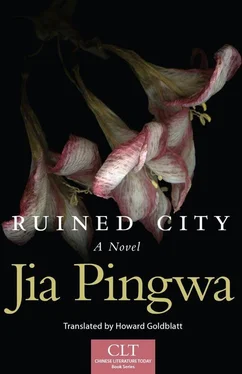“It was raining,” he said to some friends who had come to check on them, “so I didn’t go out to set up my cigarette stand. I went to bed, and the more I slept, the sleepier I got, like the fatigue I’ve accumulated over the summer finally caught up with me. Then a crash startled me awake. I said to myself, ‘What’s fallen this time?’ I came out and saw that the wall by the latrine had collapsed. People all around had walls crumple or eaves give in, so it was no big deal. I’d take care of it when it cleared up, I thought, and I went back to bed. But then I couldn’t sleep, wondering where my mother was. She slept in that small room across the way. She had a hunchback, but her hearing was sharp, and she always came out to look around when she heard a noise. She’d call out to me or my son, saying that something had happened to so-and-so’s house and telling us to go check it out. But why hadn’t she made a sound after the crash of the wall? I told my son to see if she was in her room. He came back to say she wasn’t there. I thought she might have gone out to look at the flooded lanes, so I went back to bed. Then I had to pee, so I got up and walked over to the latrine, where I saw my mother’s tiny shoes floating in the pit. I panicked and immediately got down to remove the bricks, and I saw one of her hands. She was buried alive when the wall fell on her as she was using the latrine. That damned mayor. He spent money and time building cultural streets and art streets, but he wouldn’t spend anything on houses for us. Let the rain come to destroy all the houses around here. He should be here when everyone is dying under crumpling walls, shouldn’t he?”
“Don’t talk like that,” someone said. “Don’t you watch the news? The mayor has been running around the past few days helping people in the disaster areas. I heard that three hundred houses collapsed in the lowlands north of the west gate and that twelve people died. Someone has called the mayor. He’ll be here soon. So no more talk like that. He’s serious about helping, and will surely send relief supplies and money. He’s only human, and he’d be so unhappy to hear what you just said, he might give us only half a million of the million we deserve.”
Shunzi nodded as he carried over two figurines a neighbor had bought for him. He tearfully went inside to place them on the table, where he knelt and wailed like an old cow.
Unable to stand the sight of people crying, Liu Yue walked off, tramping through muddy water. Stumbling along an uneven road surface, she traced the sounds of vehicles and human noises from a distance, her mud-splattered pants legs getting soggy. Then she saw someone shooting street scenes with a video camera. There were many clusters of people, some carrying pumps and other shouldering tarps, all rushing in the same direction. She spotted Zhuang Zhidie and walked over to tug at his shirt. “You’re here, Zhuang Laoshi.”
“The mayor asked me to take a look. I couldn’t say no. Is the old lady all right?”
“She’s fine. She wants you to burn some spirit money for Grandpa, saying he came back today.”
“How can I get away to do that? After I’m done here, I’ll probably have to go to the lowland area north of the west gate.”
She turned and walked away, but came right back and whispered, “Which one is the mayor?”
He pointed to a tall man who had joined a group of residents at the entrance to the lane. “It’s a tough job,” she said.
“Of course it is.”
“I’ve seen a thief being beaten, but not how a thief eats.” That drew a glare from Zhuang, who walked off to join the group of people.
The rain stopped that evening, but Zhuang did not go home. The special topic on that night’s TV broadcast was a disaster relief report from the mayor to the residents. He said the city was simply too old, and that municipal construction projects had incurred a substantial amount of debt. After rebuilding four lowland areas, the government would work hard to secure funding to rebuild the lowland areas north of the west gate and around Shuangren fu Avenue.
Zhuang was put up at a hotel, where he worked all night with reporters sent by the Propaganda Department to write about the disaster relief effort. Focusing on observations of the disaster and plans for rebuilding the lowland areas, they produced a report of more than ten thousand words that was published in the municipal paper two days later. When it was time to check out of the hotel, Huang Defu came on behalf of the mayor and hosted a banquet to reward their effort. It was a sumptuous meal, but they were too tired to have much an appetite, so half the food went untouched.
“Do you have a cat at home, Mr. Zhuang?” Huang said. “Why don’t you take the fish home? Then we won’t be wasting food.”
That reminded Zhuang of Wang Ximian’s wife, so he put the fish in a plastic bag and, after leaving the hotel, headed for Juhuayuan Street.
Wang’s house was a two-story structure he’d remodeled in a traditional compound. In front of the house stood a large willow tree that provided shade for half the yard. Ivy with sturdy vines and dense leaves was planted all around, giving the house the look of a lush green haystack. Zhuang rang the bell, but no one came to the gate, so he pushed it open. He walked in, but still no one came out, not the maid nor Wang’s mother. The stone steps were covered in moss, and a leaf had fallen with its stem stuck in the moss, quivering in the breeze. To him, the rain had turned the yard gloomy and chilly, instead of imbuing it with serenity. As he wondered where everyone was, a cat came out; it stopped and sat down three steps away to watch him with its bright eyes. Then it swished its tail and walked back inside. Zhuang knew that it was the pet belonging to Wang’s wife, so he followed it inside. Instead of pausing in the hallway, the cat started up a spiral staircase, turning toward him halfway up. He took the staircase to the second floor, where he looked into the room facing the stairs and saw Wang’s wife leaning weakly against the head of her bed. She smiled at him. Putting down the bag, he walked in and asked, “Are you not feeling well?”
“I’m not well enough to go downstairs, but I knew it was you when I heard your footsteps in the yard. Where were you? How did you know I was ill?”
“I didn’t. What’s wrong? Have you seen a doctor?”
“My back hurt two days ago when I got up in the morning. The maid said I had boils on my back. I ignored them. But they hurt badly last night, and my back has gone stiff. So she took me to the hospital this morning. The doctor said there was pus, so he opened them up, cleaned them out, and applied some ointment. They no longer hurt, but I’m drained of energy.”
“Let me see what they look like.”
“No need for that. My once-smooth back is now an ugly sight,” she said, shifting to make room for him to sit on the bed.
“Is Ximian away again? Where are the maid and the old lady? Have you eaten?”
“He’s still in Guangzhou. The old lady and the maid might have gone to the post office to send him a telegram. Help yourself to some water.”
Saying he wasn’t thirsty, Zhuang added, “That’s strange. I’ve got boils on my back, too, but they don’t itch or hurt. Yours seem to be much worse.”
She was visibly surprised by what he said. “Is that right? What a coincidence. You’re not saying it as a joke to make me feel better, are you?”
He unbuttoned his shirt to show her. Yes, seven boils lined up like the Big Dipper. She froze at the sight, seemingly lost in thought. When he turned around to button his shirt, she said, “I see you’re still wearing the coin.”
“Yes.”
She lowered her eyes as tears fell, a stirring sight that rendered him incapable of saying or doing anything. Then he spotted her tiny foot under a thin embroidered blanket, resting limply sideways. After reaching out to cover her foot with a corner of the blanket, he let his trembling hand stay on it. She dried her tears and smiled sadly. “What did you bring me?”
Читать дальше


![Matthew Vincent - [you] Ruined It for Everyone!](/books/216429/matthew-vincent-you-ruined-it-for-everyone-thumb.webp)









